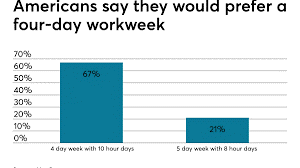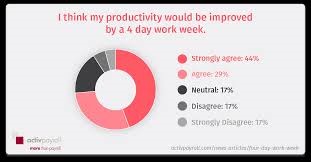Introduction
What is the 4-day workweek?
The 4-day workweek means what the name implies or rather sounds like: a working scheme that reduces the work weekdays from 5 to four, instead of working five days each week, from Monday to Friday employees only have four days.
A 4-Day Work Week may seem radical but we’ve gradually reduced the number of hours worked within a typical workplace since the 19th century—in 1890, the United States government estimated that an employee in manufacturing plants worked 100-hour weekly. By mid-2050 they had been working 40 hours per week; today, workers are on their clock for ten or more days and can work up to 28 hours over the four-day weekend. This means people could be doing this by taking advantage of our 4 Day Work Weekends as well, while they go about their normal but productive life.
New Workdays, Better Result!
The COVID-19 pandemic is taking its toll on the world’s workforce. On the wheels of the swift shift from the physical all-day work to remote sauced work weekdays, many employers and employees alike have realized that productivity does not necessarily depend upon working between 9 am and 5 pm, but rather on what they do at home or in the office. In 2018, a New Zealand company with 240 workers instituted an 8-day workweek where employees were expected to work for 32 hours of their time every two days; researchers found that employees completed the same amount of task, as previously done in the regular five days: A quarter said they managed their work-life balance more effectively, stress decreased while job satisfaction increased across all employees. Now the employees work with convenience and ease, producing as much result as expected.


Graphical Representation of the productivity chart of the 4-day work week
Ideal Schedule for Everyone
A four-day workweek scheme is not just for people who are working 40 hours per week, but also for those who prefer to work 10 or more days off. The idea of a 4-hour job would be different for every company, and it can be done in two ways: First, employees have to decide what they want to do with their time—but you can choose any day that suits your business needs and the employees’ preference. Glassdoor recommends companies first determine why they want to offer eviction from the workforce; this includes how much overtime is paid on Mondays.
The 4-day workweek has created the beam of balance for married employees, basically, those that are just starting their homes, helping them walk through work and as well make their homes with ease, leaving no party starved of its basic needs. The new 4-day workweek is a better way to work.
4-Day Workweek around the world
A handful of countries have already introduced the 4-day work week, clearly believing that its pros outweigh its cons.
a. a. Iceland had such a positive experience in trailing it that 85 percent use this schedule;
b. b. Spain announced in March 2021 they would commit to three years working a 32-hour Workweek without having any cut or loss in compensation. The government has committed to companies who want them and will make up the difference for those willing participants. In August 2021.
c. c. In America, UH Rep Mark Takano (D) put forward his Thirty-Two-Hour Work Week Bill as part effort to readjust American workers' lives with overtime pay.
d. d. Iceland has just completed the world's largest pilot project trialing the four-day week, involving more than 2,000 workers. This experiment has proved successful and has reignited the debate surrounding a measure that has long been advocated as a way of increasing employee wellbeing and productivity.

Intresting, I am informed, please more of it
You must be logged in to post a comment.